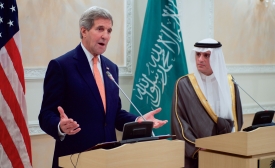counter terrorism
What propels Islamist terrorism and attacks against France is more than an academic debate: The answer shapes policy toward blunting the threat. So it is no inconsequential matter in a culture under attack, and one that so cherishes its intellectual debates, that France’s two leading scholars of radical Islam — former friends — have turned bitter rivals over their differing views.

A look at more than 70 years of diplomatic relations between the United States and Saudi Arabia, and why that strategic partnership matters today.
Many studies have shown that global-terrorist threats cannot be solved solely by an individual state. In this sense, the practices of dialogue and cooperation, both through government-to-government and people-to-people contacts, should be maintained by Indonesia and Egypt.
The State Department is revamping its floundering efforts to curb recruiting by the Islamic State and other terrorist groups, senior U.S. officials tell Foreign Policy, in response to growing dissatisfaction in the White House and Congress at existing attempts to stop the spread of the extremists’ ideology. The changes ordered by Secretary of State John Kerry, which have not previously been reported, shift significant power to a single bureau at the State Department tasked with coordinating all counter-extremism efforts.
On January 8, heavies from the White House and U.S. intelligence and security sectors arrived in San Jose, California [...] to examine a pressing, worldwide problem: “How can we make it harder for terrorists to leveraging [sic] the internet to recruit, radicalize, and mobilize followers to violence?”







